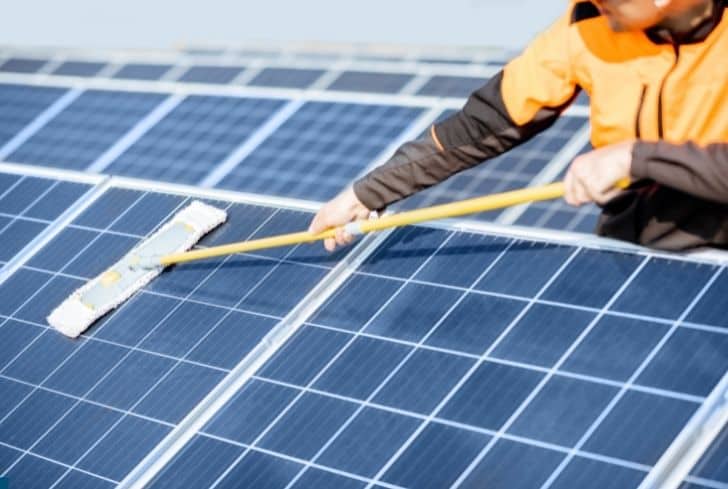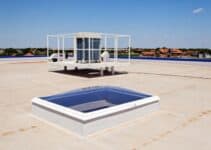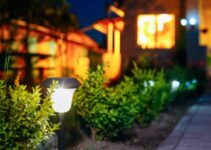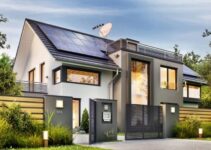Your solar panels are less efficient when they’re dirty – the grime, bird droppings, and dust blocks the sun’s rays from reaching the photovoltaic cells. And contractors will likely charge an average of $150 to $300 to clean them for you.
However, many homeowners realize that cleaning solar panels is one of those things you can do yourself. There are many ways around it, such as using a highly effective degreaser like Windex, but not all of them are safe.
Keep reading to discover if you can clean your solar panels with Windex.
Is Windex Good To Clean Solar Panels?
Some suitable things for cleaning solar panels will surprise you, but is Windex one of them? You may think that the brand is already trusted for keeping mirrors and other glass surfaces clean, so is Windex good for cleaning solar panels?
Well, it is. Although the panels are made of delicate glass, the materials in Windex aren’t too harsh for them. This cleaning material comprises surfactants like ammonium hydroxide, 2-hexoxyethanol, and isopropanolamine.
They loosen grime and other pollution from the glass surfaces by targeting their grip; all you’ll do is wipe.
Then the Liquitint dye makes the surface gleam with a bluish tint.
How to Clean Solar Panels With Windex?
Windex is one of your cheaper options for cleaning solar panels. Here’s how to do it:
- Turn off the solar system and disconnect it from other energy sources.
- Use a ladder to access the solar panels and use the Windex hose applicant to spray bird droppings, grime, and other pollution.
- Now, use the soap setting to apply an even layer to the surface and frames and allow to sit for fifteen minutes.
- Use water to remove the rest of the suds.
Can You Clean Solar Panels With a Pressure Washer?
When the solar panels are clean, the inverters work super efficiently. And although it’s easy to buy your panels, install them on the roof, and forget all about them, it’s not uncommon for bird droppings and other pollutants to stick to the surfaces.
And this blocks direct sunbeams, which are more potent for solar cells. However, can you clean solar panels with a pressure washer? That’s a valid question, but the answer depends on how much pressure you’re using.
Pressure washer breaks the seals surrounding the solar cells if too much, creating an entryway for water and humidity. This happens when the damage widens over time, leading to a more significant leak, affecting the system’s efficiency.
Higher pressure will spoil the panels, but you can use this device safely if you don’t aim the washer directly at the solar cells. However, it’s best to adopt safety precautions:
- Turn off the solar panels first- follow the manual if you don’t know how to.
- Ensure the surface is strong enough for your weight, or avoid putting your whole body on the panels.
- Get a strong ladder for climbing the roof.
- Use a safety harness if the panels are installed at a tilted angle.
- Boots with non-skid soles are better for safety and avoiding falls and slips.
- Don’t clean during a rainstorm or on a cloudy day.
- Ensure there’s access to first aid before mounting the roof.
Can You Clean Solar Panels With Tap Water?
Tap water has a high mineral content, which may raise the concern of whether it’s safe for washing the delicate surface of solar panels or not. However, you can clean solar panels with tap water, but you must completely dry the surface to remove mineral residues that may cause problems later.
Mop up the rest of the water to prevent a hard film layer from forming. If that happens, it reduces the solar cells’ ability to synthesize electricity.
Now, the best option is using rainwater – install your solar panels at an appropriate tilt. But again, this method needs observance of the rules of optimal vertical angle.
Can You Clean Solar Panels With Bleach?
Using bleach to clean the surface of solar panels is not recommended because of the harshness of chemicals present in this cleaning fluid. If it contacts areas like the aluminum frame and fragile encapsulating films, the damage may be in the form of discoloration or rust.
Essentially, avoid using bleach or other potent agents to clean the surface of your panels to avoid destroying the anti-reflective coating. Again, if that happens, it impedes the amount of sunlight that penetrates the photovoltaic cells.
These factors affect the efficiency of power output, often negatively. There are better materials for cleaning solar panel surfaces.
Is Vinegar Good For Cleaning Solar Panels?
Vinegar is good for cleaning solar panels. It’s a natural cleaner that won’t affect solar panels that are not made of metals like aluminum.
Vinegar is terrible for materials made from aluminum because it causes corrosion. If you’re unsure about the material yours is made of, check the producer’s information.
Now, cleaning solar panels with vinegar must be done the proper way. Add a quarter cup of vinegar, half teaspoon of non-abrasive liquid soap, and two cups of water into a spray bottle and mix thoroughly.
Then, spray the solution on the solar panels to control the amount of dust and undesirable substances on the surface. The detergent increases the cleaning capacity, even though it’s not necessary.
Many types of vinegar are made from acetic acid and other varying ingredients. However, white vinegar is best for cleaning solar panels because it’s made of only two ingredients – acetic acid and water, which are ideal for delicate surfaces like photovoltaic cells.
What Should You Not Clean Solar Panels With?
Cleaning your solar panels is an important way to maintain efficiency. Studies have shown that solar cells lose fifteen to twenty percent of their electricity generation capability when dirty.
And while there’s no designated timeframe for washing solar panel surfaces, some places require it more often. If they lack brilliance or a bright sparkle, it may be time to clean them. The early hours of the morning or evening time are ideal. Avoid washing them when the sun is out, as the surface will dry faster, and streaks may appear.
Moreover, if you live where dust storms and other unfavorable weather elements are common, you should clean your solar panels more often. Additionally, they need to be cleaned if exposed to bird droppings and other pollution.
Check the surface at least once weekly; don’t wait until the efficiency is affected. And avoid cleaning solar panels with the following things:
High-pressure Washer
High pressure washer can break the seals surrounding the solar cells if too much, creating an entryway for water and humidity. This happens when the damage widens over time, leading to a more significant leak, affecting the system’s efficiency.
Hard-bristled Brush
Instead of using hard-bristled brushes, clean your solar panels with only soap and water. And you need the right texture of bristles to wash the delicate solar panel surfaces.
If the bristles are too firm, they may scratch and damage the solar cells, reducing efficiency. Even if you intend to scrub gently, using a hard-bristled brush is still dangerous.
Potent Cleaning Fluids
Naturally, you’ll assume that potent cleaning agents are ideal for solar panels, considering they’re mostly outside and on the roof. And the dirt and grime may be trickier to clean.
Moreover, these fluids sometimes contain harsh chemicals that are too potent for delicate solar panels, and using them may affect efficiency. Liquid soap for dishes is ideal, but ensure it’s alcohol-free or has low levels.
Or you can invest in high-quality products that have been specially designed to clean solar panels. They often contain materials that can even cause corrosion.
Abrasive Cleaning Products
Abrasive cleaning products are often too harsh for solar panels and can scratch their surfaces. Fine brass wool, whiting, nylon-coated sponges, and plastic mesh pads are terrible for cleaning solar panels.
It’s also best to avoid abrasive detergents; they have similar effects.
When cleaning solar panels, avoid the following:
- Cleaning the solar panels without reading the manufacturer’s instructions.
- Using abrasive cleaning agents will scratch and damage the glass.
- Washing the solar panels when there are cracks on them.
- Scraping the panels with metal scrapers.
- Applying too much pressure when cleaning the panels.
Safety Tips While Cleaning Solar Panels
Adopting the proper practices when cleaning your solar panels is important because it ensures your safety and the longevity of your investment. Here are some tips:
- Avoid cleaning the panels when the weather is unfavorable, such as during heavy rain or thunderstorm.
- Ensure the surface is not wet and slippery before mounting and place your weight appropriately.
- Remove your metallic jewelry when cleaning solar panels.
- Don’t use the panels to secure your position while cleaning.
- Ensure the panels are sturdy enough to bear your weight.
- Wear safety gear while cleaning solar panels – gloves, shoes, face mask, and helmet.
- Don’t clean the solar panels unaided – ensure a family member or friend is nearby in case there’s an accident.
How To Clean Solar Panels?
There are some similarities between cleaning your solar panels and cleaning your windows. That’s why Windex is a suitable material for the process.
Moreover, it doesn’t consume too much time; unless you allow the dirt to build up. This will require more cleaning time, and if you don’t notice it on time, it affects the technology’s efficiency.
It’s best to choose a cool day for this chore. And if you won’t use Windex, mix some warm water and a safe cleaning agent into a spray bottle, and bring a towel to remove the streaks. Brush off loose dirt before spraying to make the process easier.
And attaching a nozzle attachment to your hose will help you get to the dirt more easily. Buy a squeegee extension to simplify this chore. Use adequate water to rinse the surface to prevent streaks and smudges from blocking sunlight access.
It’s also best to ensure you remove every remnant of tap water from the surface. Rainwater is better for cleaning solar panel surfaces because of its low mineral content, but tap water will do since it’s not always available.
If it’s not safe for you to rest on your solar panels, it’s best to invite a professional to clean them. There are many affordable experts that you can hire if you’re not comfortable doing it yourself. The most important thing is having a transparent and clean surface between the photovoltaic cells and sunlight.
Conclusion
Solar panels need to be cleaned now and then to remove anything that may prevent the adequate supply of sunlight in the area. It’s often caused by an accumulation of dirt, which eventually affects the power supply’s efficiency.
If your solar inverter isn’t as efficient or doesn’t last as long as it used to, it could be because it needs cleaning. There’s no specific time to clean them, but your location and climate may determine the frequency.
Essentially, there are safe and unsafe ways to clean your solar panels, as you’ve seen in this blog post.






